A wide selection of clothing and footwear – from boots to espadrilles – can be found at the traders’ stalls that line the pavements on De Villiers Street in downtown Johannesburg.
De Villiers Street in central Johannesburg is, at first glance, pure sartorial chaos.
Every inch of the three blocks of pavements from Rissik to Hoek streets is covered with stalls selling second-hand clothing. From jackets to skirts, shoes and even underwear, sellers of pre-owned clothing are doing a roaring trade, with food and hair vendors squeezed in between for good measure.
Underlying the apparent chaos is a well-oiled informal economy machine that is meticulously run under the leadership of the African Traders Organisation (ATO).
In existence since the sale of second-hand clothing started in De Villiers Street in the 1990s, the ATO was only registered as a profitable organisation in the aftermath of the controversial Operation Clean Sweep in 2013. The Johannesburg metro police department cleared the city centre of the illegal traders and in many cases confiscated their goods. ATO formalised itself to engage the authorities.
“Decisions about us cannot be taken without us. We need to be involved,” ATO chairperson Franklin Eneh said this week.
Most of the second-hand clothes traders are Nigerian; others are South African and Malawian. In the early hours of Monday and Thursday, they sell bales of clothes to other traders who have come from as far as Kimberley in the Northern Cape and Mozambique. These traders will, in turn, resell them in their towns and these profits are often their only source of income.
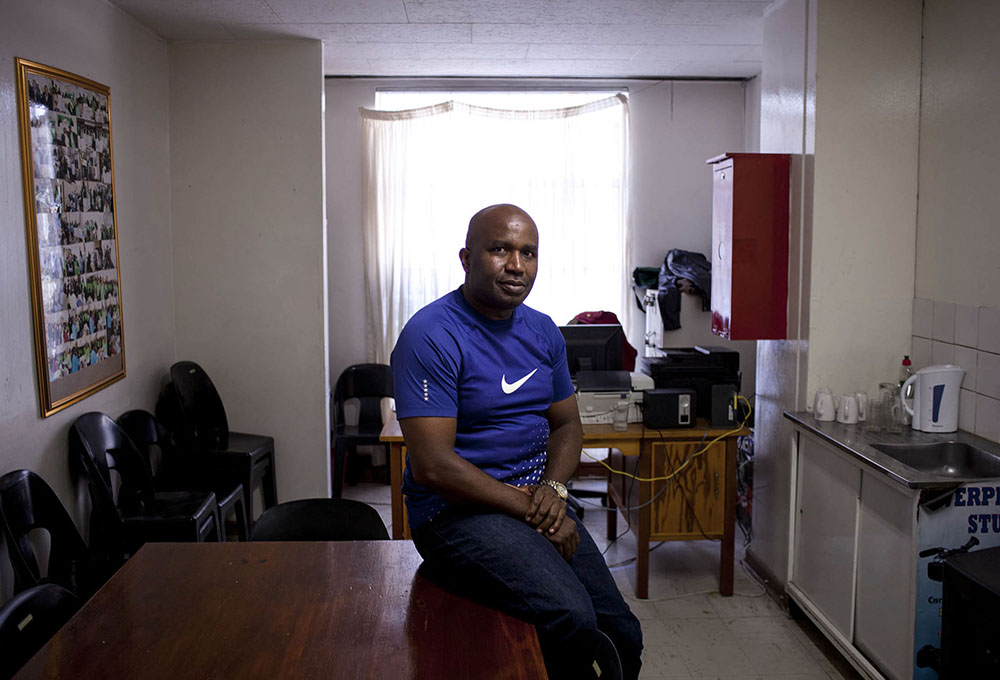
Franklin Eneh says the body wants government to decriminalise the sale of second-hand clothing. (Photos: Oupa Nkosi, M&G)
“The cheapest way for many to survive is through second-hand clothing – not just for the traders but the thousands of customers who cannot afford to buy retail store clothes,” said Eneh.
The entire business, however, is technically a criminal enterprise. In efforts to rescue the declining local textile industry, South Africa imposed laws in 2002 on the importation of second-hand clothing for the purpose of being sold.
Rika Theart, senior manager at the International Trade Administration Commission, said used and second-hand goods can only be imported on the basis of an import permit issued
by Itac. “The commissioner of Sars [South African Revenue Service] is authorised to deal with imported donated second-hand clothing without further consultation, provided that the weight of the clothing is less than 2?000kg per consignment, the clothing is to be donated, is registered as a nonprofit organisation with the department of welfare and social development, and the clothes are intended for indigent people and will not be sold on the open market.”
But the imports are not being controlled and donated second-hand clothing from developed countries, often glamorous label discards, have found their way into the marketplace instead of charities. A walk down De Villiers Street and a visit to the trendy pop-up markets in Braamfontein and Maboneng Precinct is evidence enough that this is a thriving business.
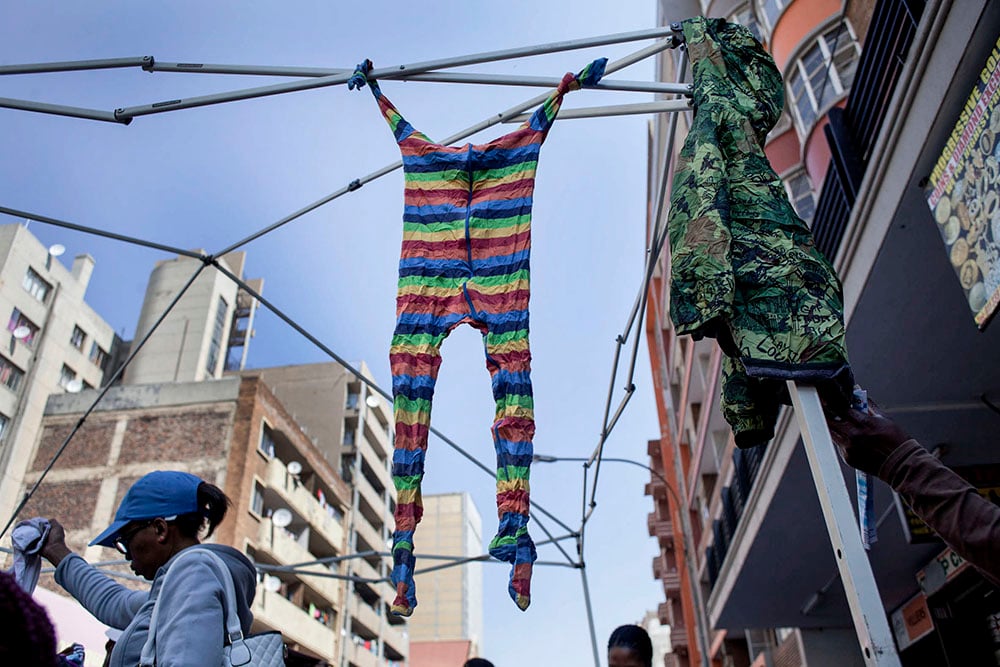
Sellers of pre-owned clothing attract customers from all over Southern Africa.
ATO would love to see the second-hand clothes business being decriminalised.
Eneh said the organisation would like the government to recognise second-hand trading as a legitimate business, because it is the reason many people are able to feed their families and survive.
Traders are willing to abide by any of the tariffs in place, he said, as long as their source of income can be protected.
The market can seem disorganised, but the ATO is adamant that they operate in a systematic way that protects both the traders and their customers.
“We are governed by a set of rules which we take very seriously. Traders cannot have bundles of clothes on the floor – if we see clothes on the floor we confiscate the trader’s stock until they pay a fine for misconduct,” said Matron Mhlanga, ATO’s general secretary
To many, these three blocks are known as Dunusa (an isiZulu word that means to bend over), which describes the movement that people make as they ruffle through the bundles of clothes looking for once-in-a- lifetime items.
ATO has 205 registered second-hand clothes traders operating from De Villiers Street daily. The organisation’s leaders say it is a profitable organisation that aims to go beyond protecting the human rights of traders to also show that their informal operations are organised and run in an orderly manner.
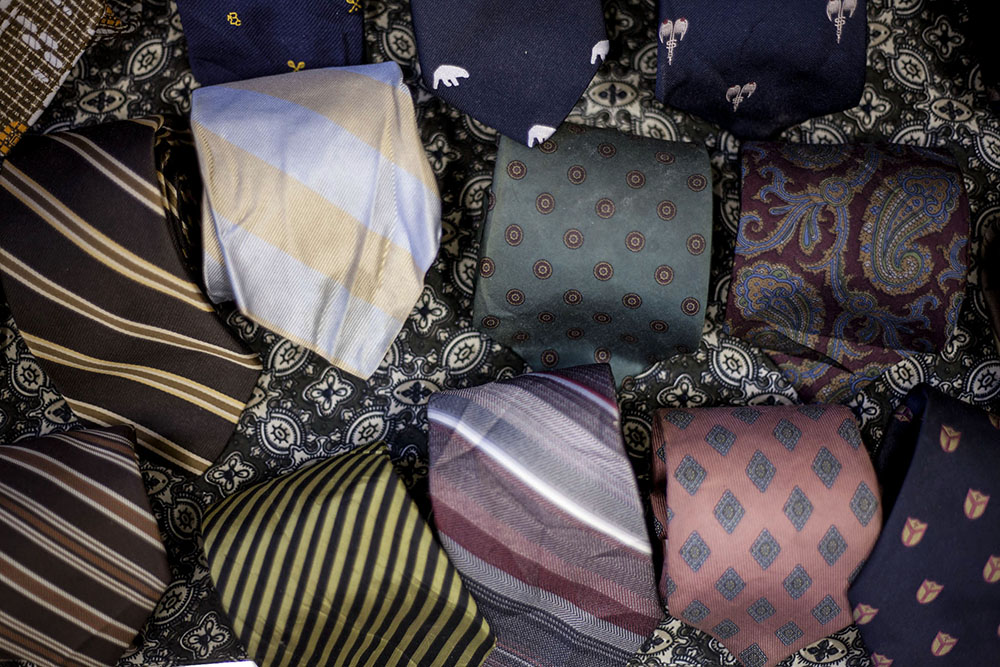
The traders sell specific items, making it easier for customers to find what they want.
Traders, mostly young men, are shouting out the items that they are selling in their stalls: “Winter mix!”, “Blazers! Blazers! Blazers!”, “Underwear!” They each sell a specific item of clothing, which makes it easy for customers to look for what they want. The underwear stall is surrounded only by women who self-consciously lift their desired items to size them up.
“I sell these in the townships. They are cheap, hey. All I do is wash them and people will buy them. I also buy for myself and my children.”
“These panties are good quality – they are from Europe,” said one customer.
Next to his denim jeans stall, a young Nigerian is accosted by a man in a police uniform. The officer asks for his papers, but the man doesn’t respond and stands timidly against the wall. As the officer leaves, his fellow traders approach him to ask if he is okay.
This sort of confrontation is nothing out of the ordinary for Dunusa’s traders.
Mhlanga, who was an activist for the Workers and Socialist Party for a number of years before joining the ATO executive committee, said: “The police sometimes harass us, but we know that they shouldn’t – only customs has a right to come here.”
As the sun sets, the Dunusa traders pack up their bales in preparation for another day of business. They don’t know what tomorrow brings but are confident there will be customers – whether it is a millennial looking for a statement item to impress their friends at the hipster markets over the weekend or a gogo looking for a coat that will last her through the winter.
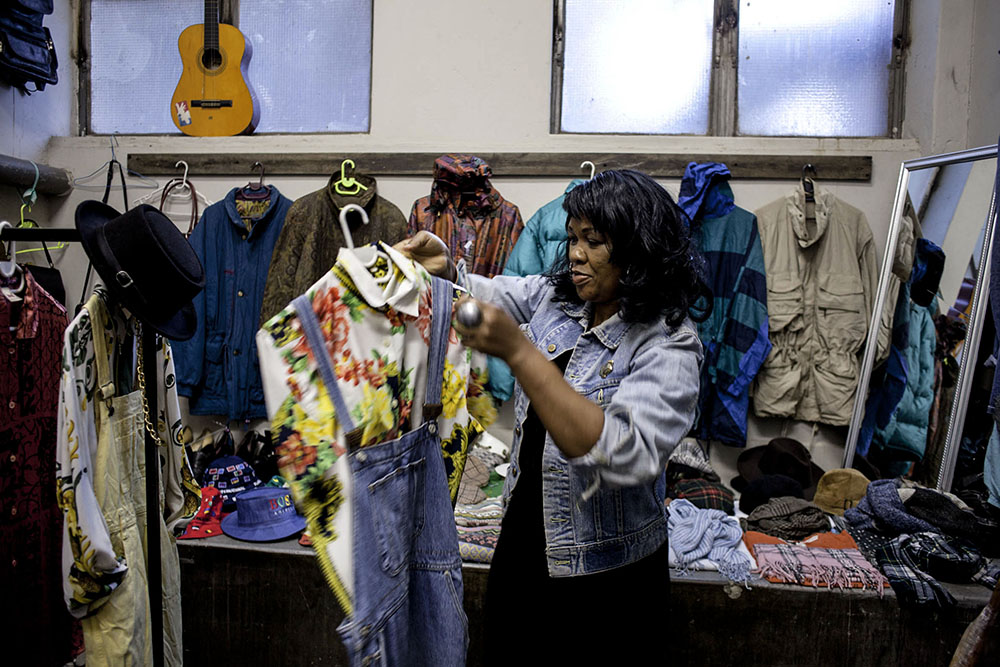
The woman with a flair for vintage
Tucked away in a corner of the vintage market on Miriam Makeba Street in Newtown, Jo’burg, is Brenda Matshoba’s store, Flair Vintage.
Originally from Mpumalanga, she started selling her mother’s clothes and then quit her job to sell second-hand clothes full-time.
Matshoba sources most of her clothing from the traders in Dunusa. She takes them home where she washes, irons and customises them into unique items.
She makes her clothing more accessible to people who prefer not to go to Dunusa.
“Most of my customers are young fashionistas … students and artists. They come here to find statement pieces for events or photo shoots.”
Matshoba’s items are one-of-a-kind, which many of her fashion-forward clients appreciate. For her, this is more than just a business – it is a passion that allows her to relive the 1980s and 1990s through fashion without her customers having to spend too much money.
“Everything in here ranges from R50 to R400,” Matshoba says. “I make sure that my prices are affordable.”
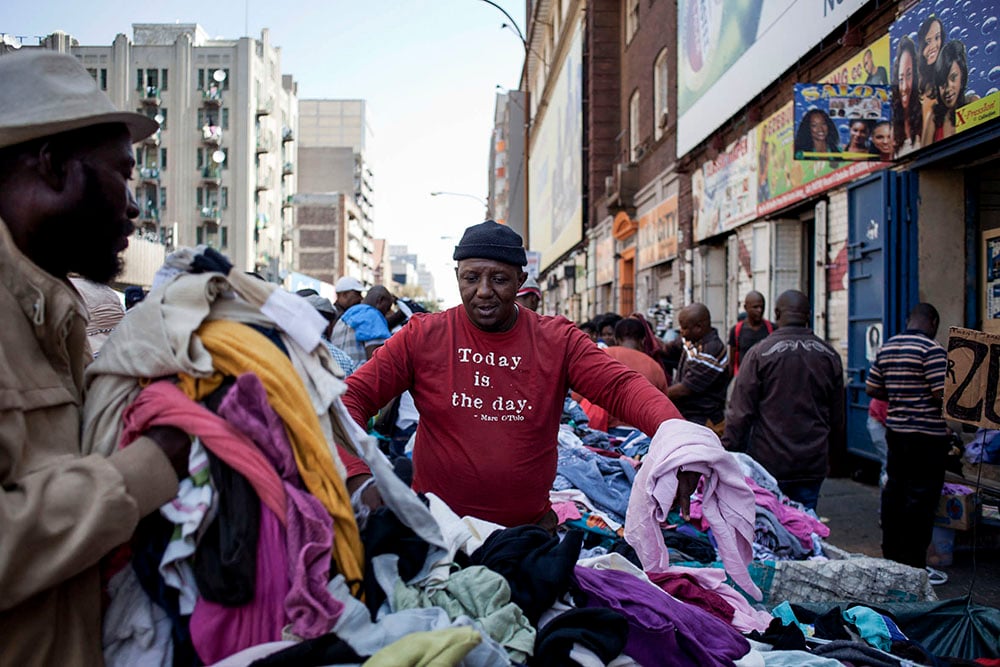
A self-sufficient seconds seller
Oupa Nkabinde is one of the few South African traders on De Villiers Street. Before trying his hand at trading in second-hand clothes, Nkabinde sold ornaments door-to-door in Cape Town. Once he realised selling clothes was more profitable, he came to Johannesburg to do it full time.
“It feels good to work for myself, I don’t have to depend on other people and I make more money now,” he says.
Nkabinde supports his family through the profits from his stalls and has expanded his business interests: “I have other properties that I have built using my profits. Trading has taught me how to be independent and innovative in how I make money.” Nkabinde describes his biggest challenge as how police treat foreigners who come and buy from the traders’ bales. Nkabinde says they are often harassed and asked for their asylum or refugee papers.
“Through ATO [the African Traders Organisation], we have been able to reach agreements with the police and the city on how to treat customers and traders,” he says.
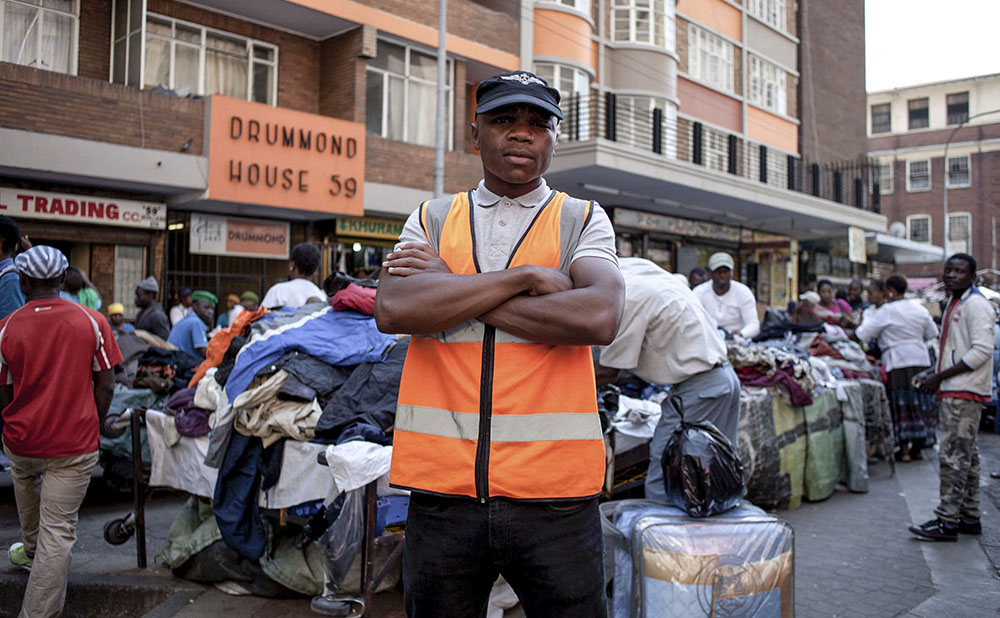
The guardian of De Villiers Street
Thabo Radebe prides himself on his job as a security guard with the community police forum (CPF) for the City of Johannesburg. He describes his job as a “fight against crime” in the three blocks that make up Dunusa, a hot spot for pickpockets and handbag snatchers.
“I love my job, I am here to make sure that everyone here is safe,” he says.
He is greeted by traders and regular customers as he patrols. Radebe shops in Dunusa as well, bagging high-end brands for reasonable prices. It makes him feel like he is up to speed with the latest trends – which would be more expensive if he bought them through retailers.
Although there is some kind of working relationship between CPF patrollers and the police, Radebe avoids confrontations that involve police and non-South African traders because he values their entrepreneural skills over whether they are documented or not.
“If these traders were not here, we would suffer. I have been working here for seven years. We help each other out,” he says.
For Radebe the relationship between the traders and customers shows that Africans can live together peacefully.